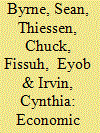| Srl | Item |
| 1 |
ID:
082151


|
|
|
|
|
| Publication |
2008.
|
| Summary/Abstract |
This article examines the images of 98 study participants interviewed during the summer of 2006 and a public opinion survey of 1,023 adults conducted in October 2006 with regards to the role of the European Union (EU) Peace II Fund and the International Fund for Ireland (IFI) in community development, reconciliation, and sustainable peacebuilding. The perceptions of community group leaders, funding agency civil servants, and development officers are explored with regards to the role of both funds in building the peace dividend in Northern Ireland. Further, the article explains the importance of community development and cross-community contact through joint economic, peace and justice, and social development projects.
|
|
|
|
|
|
|
|
|
|
|
|
|
|
|
|
| 2 |
ID:
082154


|
|
|
|
|
| Publication |
2008.
|
| Summary/Abstract |
What constitutes a successful peacebuilding outcome? This paper identifies four common standards for peacebuilding success and explores them conceptually and operationally. War recurrence, the most salient marker of peacebuilding failure, is a necessary but insufficient indicator. Yet other standards are also problematic. This paper argues for a standard that includes (a) the recurrence of large-scale organised violence, plus (b) political and institutional elements that minimally indicate a state capacity for resolving social conflicts peaceably. Even as better cross-national indicators of institutionalising peace are needed, national and international decisionmakers should interpret any such standards with caution and in ways that are highly context-specific in developing policies.
|
|
|
|
|
|
|
|
|
|
|
|
|
|
|
|
| 3 |
ID:
082149


|
|
|
|
|
| Publication |
2008.
|
| Summary/Abstract |
Mainstream views maintain that liberal democracy mitigates recourse to political violence. 'The ballot replaces the bullet' is a belief informed by the Democratic Peace Thesis, which not only posits that peace will pervade between democracies but, by way of a 'domestic analogy', within. How then do we explain cases of entrenched political violence within established liberal democracies, such as ETA in Spain? As the world experiments increasingly with liberal democratic forms of governance, too much is taken for granted about the relationships between liberal democracy and recourse to political violence. Hence, this article aims to add understanding on this important contemporary issue from an identity perspective by adapting the Copenhagen School's concept of 'societal identity security'. Using two case studies wherein the relationships between the liberal democratic framework encounters 'Other' group identity notions of how to live together, the article concludes that, on the one hand, liberal democracy can mitigate recourse to political violence for those groups with compatible identities. On the other hand and in opposition to mainstream opinions, liberal democracy can facilitate recourse for those groups which construct their identities in ways incompatible with its core principles (e.g., individual egoism or free market economics). This paradox stems from an internal contradiction of orthodox liberal democracy: specifically, that while claiming to accommodate and hence provide security for diverse groups, this accommodation does not extend to its core principles about 'the good life'.
|
|
|
|
|
|
|
|
|
|
|
|
|
|
|
|
| 4 |
ID:
082153


|
|
|
|
|
| Publication |
2008.
|
| Summary/Abstract |
Vibrant grassroots peace processes served as a prelude to the formal peace agreements in both Northern Ireland and between Sudan's north and south. The comparative analysis of these two processes provided in this article yields information on how local NGOs brought people in deeply divided societies to engage in constructive inter-ethnic interaction. In so doing, it illustrates the efficacy of John Paul Lederach's conceptual framework explaining 'reconciliation' as a process. The comparative analysis also produces evidence for testing the efficacy of three hypotheses on the contributions a local peace process can make to peacemaking between the parties
|
|
|
|
|
|
|
|
|
|
|
|
|
|
|
|
| 5 |
ID:
082152


|
|
|
|
|
| Publication |
2008.
|
| Summary/Abstract |
Developing a theoretically driven causal model of state failure is necessary if scholars are committed to improving the predictive power and forecasting ability of early warning models of state failure. Building upon the work of the State Failure Project1 and earlier statistical models of state failure,2 this study develops a causal model of state failure that is based upon a theoretical foundation that satisfies the parsimonious condition that policy forecasting models typically rely upon. The statistical model of state failure developed for this analysis extends the work of previous models by developing an alternative definition and measurement of state failure and introduces factors that are appropriate for making predictions and establishing causation.
|
|
|
|
|
|
|
|
|
|
|
|
|
|
|
|
| 6 |
ID:
082150


|
|
|
|
|
| Publication |
2008.
|
| Summary/Abstract |
Spoiler theory has been used to explain the downfall of many peace processes. This article uses the Russo-Chechen peace process of 1996 as an example of a process in which the agreement itself set the stage for the appearance of spoilers. Using ripeness, readiness, and relative deprivation theory, this article identifies the factors that pushed both sides toward the 1996 agreement and then pushed them away from adherence to its provisions for follow on negotiations. The limited nature of the agreement created the spoilers that endangered the peace immediately after it was signed.
|
|
|
|
|
|
|
|
|
|
|
|
|
|
|
|